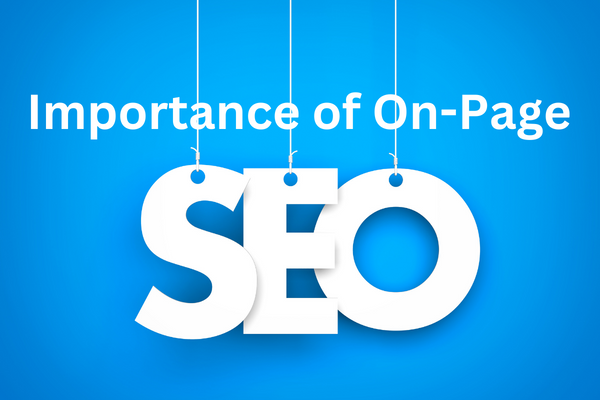Importance of On-Page In SEO
SEO (Search Engine Optimization) is a complex and ever-changing field. It consists of various factors that contribute to the visibility of websites in search engine rankings, such as keyword usage, content quality, and link building. On-page optimization, however, is one of the most crucial SEO components. This can have a huge impact on how well your website performs in organic search results. In this blog post, we'll discuss why on-page SEO is so important and how to effectively optimize your website for it. We'll also look at some tips for improving your rankings and understand why it’s so essential for businesses to stay up-to-date with their online presence.
What is on-page SEO?
To rank higher in search engine results, a website must be optimized for SEO. On-page SEO refers to the optimization of a website’s content and code to improve its ranking in search engine results pages (SERPs).
Some of the factors that are important for on-page SEO include:
Keywords: Using relevant keywords in your content helps search engines understand what your page is about and can result in higher rankings for those keywords.
The different elements of on-page SEO
There are many different elements to on-page SEO, but some of the most important ones include title tags, meta descriptions, header tags, and keywords.
Title tags are the most important element on your page, as they tell search engines what your page is about. Make sure to include your target keyword in your title tag for the best results.
Meta descriptions are also important as they give searchers a brief preview of what your page is about. Again, make sure to include your target keyword in your meta description.
Make your text easier to read by using header tags to divide it apart. They also give more information to search engines about what your page is about. Include keywords in your header tags for best results.
Finally, keywords are obviously important for on-page SEO. Target a few main keywords for each page and sprinkle them throughout the content in a natural way. Don't stuff keywords or you'll be penalized by search engines!
Why is on-page SEO important?
For search engines to grasp the purpose of your website, on-page SEO is crucial. When you optimize your website for on-page SEO, you are making it easier for search engines to find and index your content. Additionally, on-page SEO can help improve your website's click-through rate (CTR), which can lead to more traffic and potential customers.
How to improve your on-page SEO
Several actions can be taken to boost your on-page SEO:
1. Use keyword-rich titles and descriptions.
Don't forget to use the keywords you want to rank for in your title tags and meta descriptions. This will aid in the proper indexing of your page by search engines, who will then be able to grasp its content.
2. Optimize your content.
Your content should be well-written and relevant to the keywords you're targeting. It should also include proper formatting (such as headings and subheadings) and images to break up the text.
3. Use internal linking.
Linking to other pages on your website helps search engines understand the structure of your site and find all of its pages. It also helps users navigate your site more easily.
4. Improve your page load time.
Pages that load quickly are more likely to rank higher in search results than slower ones. You can improve your page load time by optimizing your images and code, using a content delivery network, and reducing redirects.
On-page SEO tips
1. Optimize your title tags- The title tag is one of the most important on-page SEO factors. Make sure to include your target keyword in your title tag and keep it under 60 characters.
2. Optimize your meta descriptions- Meta descriptions are another important on-page SEO factor. Include your target keyword and make sure your meta descriptions are under 160 characters.
3. Use keyword-rich headlines- Headlines are one of the first things people see when they land on your page, so make sure to include your target keyword in your headlines.
4. Use alt tags for images- Alt tags help search engines understand what an image is about. So if you have images on your page, make sure to include relevant keywords in the alt tags.
5. Implement internal linking- Internal linking helps search engines understand the structure of your site and can help improve your SEO. Make sure to link to other relevant pages on your site from within your content.
6. Optimize your URL structure- URLs should be short, descriptive, and include keywords whenever possible. Avoid using special characters and stringing together random words.
7. Optimize for mobile- Mobile optimization is crucial in today’s world since more and more people are using their phones to access the internet. Inspect your website to see if it is mobile-friendly and responsive.
Conclusion
On-page SEO is an essential part of optimizing any website for search engine visibility. It helps to ensure that your pages are well optimized, making it easier for search engines to understand and rank your content in their SERPs. With the right on-page SEO strategy, you can make sure that visitors see the best version of your website when they arrive at it through a Google or Bing search. So if you want to increase traffic and improve rankings for your site, be sure to pay attention to on-page SEO!






















No comments